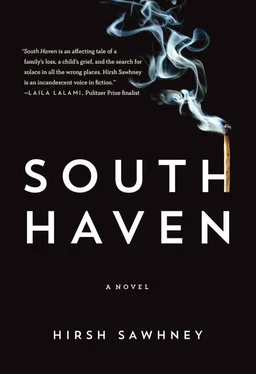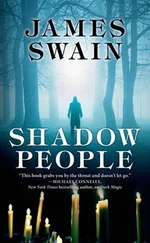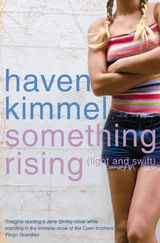They drove in silence to the next light, passing by the road that led to the dump, then the pancake house where Arjun had once worked as a dishwasher.
“He should watch out, you know,” said Barry Uncle. “My ex-wife was a gori — what a terrible storm.” As Siddharth listened to these words, a surge of optimism pulsed through his veins. Maybe Barry Uncle’s return was the sign he’d been waiting for — a sign that things were really and truly returning to normal.
Barry Uncle said, “At least Dad’s got himself a Jew. With them we have something in common.”
“I know, I know. Bad tipping and hating Arabs.”
Barry Uncle turned into a plaza containing a bridal shop and a Subway, parking next to a Jeep Wrangler. “Good man,” he said. “Yes, we both have the same problem with the Mohammedans.” He shut off the engine, and the seat belts slid forward on their own. “Listen, kid, this all must be strange for you. But your father’s a smart man. And we all gotta look to the future.”
Inside Subway, the radio was playing “More than Words,” one of Luca’s favorite songs. Barry Uncle explained that the turkey here was better than the roast beef, and that pickles went well with the peppers. He called the Latina cashier “sweetheart,” telling her she had gorgeous eyes. Siddharth wondered if Barry Uncle could knock some sense into Mohan Lal — if he could keep him from doing something stupid, like marrying Ms. Farber.
They sidled up to a booth by the window, and Siddharth asked when he would see his father.
“Don’t worry,” said Barry Uncle, his mouth full of turkey, “I’m not gonna kidnap you.” He devoured his sub, then tapped his hairy fingers against the acrylic tabletop, the two of them going quiet.
Siddharth struggled to finish his sandwich, breaking the silence by asking, “You’re a lawyer, right?”
“Me? I’m an entrepreneur — got a gas station and half a liquor store. I actually do the things that your dad teaches.” He slurped some ginger ale through a straw. “You could say this place — America — has allowed me to live with some dignity. But things are changing over there too.”
“Over where?”
“In India, boy. I keep telling your father, but he doesn’t wanna listen.”
They took an odd route home, a tape with some wailing Indians playing on the stereo. Barry Uncle asked if Mohan Lal still listened to this stuff, and Siddharth shrugged. To him, all Indian music sounded the same. Barry Uncle said, “This is Rafi Sahib. Mohammed Rafi. Real music, not like your McHammer.”
Siddharth struggled to contain his laughter.
“What’s so funny, kid?”
“Nothing.”
“Say it.”
“It’s MC Hammer, not McHammer. And he’s lame.”
“Boy, all your music’s lame. Same with your cinema. Your movies are nothing compared with the classics. Me and your Dad, we used to go to the movies once a week. Your father, he was a Guru Dutt man. But me, I loved Raj Kapoor.”
“I should know these people?”
“Don’t tell me — you don’t know Raj Kapoor?”
He shrugged. “I saw Gandhi once.”
“That trash? That’s not a movie — it’s bloody propaganda.”
* * *
Once they were home, Barry Uncle poured himself some of Mohan Lal’s whiskey. He sipped it on the armchair while reading an Indian magazine that he’d pulled out of his briefcase. Siddharth sat on the sofa, and as he watched TV, he wondered if being here with Barry Uncle was better or worse than his after-school program. Maybe the best thing would be if things could just go back to the way they were a few weeks earlier. He took the cordless phone to the bathroom and dialed Marc’s number. There was still no answer.
He recalled a time when Barry Uncle had really pissed off his mother. They were eating a standard weekday meal of daal, vegetables, and frozen pita, and Barry Uncle declared that the food was nice, but that nothing was better than piping-hot, homemade chapattis. Siddharth’s mother had slammed down her glass. She took the man’s pita from his plate and threw it in the trash compactor.
Mohan Lal’s van pulled in a few minutes after eight, and Siddharth ran to the front door to greet him. As Mohan Lal hung his blazer over a kitchen chair, Barry Uncle removed an expensive-looking bottle of alcohol from a plastic bag.
Mohan Lal held the bottle up to the light. “Wow. Rocks and soda, chief?”
“Boss, that’s the good stuff,” said Barry Uncle. “We gotta have it neat.”
The men poured the whiskey into Mohan Lal’s special crystal glasses, sipping it on the family room sofas as they munched cashews flavored with Indian spices. Siddharth sat on the armchair, eating a plate of rajma on his three-legged Indian table. He tried to concentrate on a sitcom, but Barry Uncle kept interrupting him. At one point, he told Siddharth that his table was gorgeous.
“Thanks,” he replied. “I made it all by myself — from scratch.”
“I bet you don’t even know where it’s from,” said Barry Uncle.
He scrutinized the wooden table, as if seeing it for the first time. It was only a foot tall and had a round top carved with intricate floral patterns.
“Kashmir, boy,” said Barry Uncle, who then turned to Mohan Lal. “I bet he doesn’t even know where that is.”
Of course he knew where it was. Kashmir was in India, the goddamned country that nobody would shut up about.
“Why would he know?” replied Mohan Lal. “All kids know today is television.”
“But it’s his grandmother’s place. It’s one of the most beautiful places on this earth. Sid, listen up. You must visit Kashmir one day. But your father can’t take you there now. He can’t take you thanks to these bloody Pakistanis.”
Siddharth got up to raise the volume.
Barry Uncle poured a second round and grew even louder, yelling over the television. He went into great detail about his new business. He had invested in an Indian company that would print American textbooks for a quarter of the price and then ship them back to America.
“Chief,” said Mohan Lal, “I wish you all the best, but you couldn’t pay me enough to do business in that cesspool of a country.”
Siddharth was relieved to hear these words. The last thing he needed was another trip to India. If he went to India, he’d get allergies from the all the dust and smog. If he went to India, he’d have to see his mother’s little sister, who wrote him letters once in a while and called him on his birthday every year. She had the same nose as his mother, and she bought him sweets and took him to temples. He wanted to see her again — someday. Just not now.
“Boss, I’m gonna make a killing,” said Barry Uncle. “There’s a new mindset over there.” He started going on about something called the BJP, which would revolutionize things, and a place called Ayodhya, where justice would be done. He would soon be traveling to Delhi, where he planned on meeting a man named Advani.
Mohan Lal grunted. “I’ve heard it all before, chief. If I recall, you once had an appointment with Indira Gandhi.”
“This time it’s different.”
“Different? Politics don’t change, Barry.”
“They do. They change when you call on someone with a suitcase full of greenbacks.”
They drank another round, and Barry Uncle asked Mohan Lal why his son was watching shit like Gandhi. Mohan Lal said that the kids here did what they wanted. They were individuals, not like in Barry Uncle’s beloved India. Siddharth was taken aback by the fact that his father was swearing, and that he’d begun to slur his words. But more than anything else, the men’s loud voices made him happy. Such boisterous conversation hadn’t filled the family room in a long time.
Читать дальше












